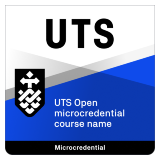This microcredential is structured into six modules and is delivered over six weeks. Each module features self-study materials, interactive activities such as quizzes, multimedia presentations, short video and audio recordings and peer critiques, as well as facilitated, live online sessions. These weekly, optional live online sessions provide an opportunity to apply the content to practical and authentic examples drawn from the workplace, with the course culminating in an industry led expression session.
The six modules are:
1. Introduction to assessment and evaluation
Explore the differences between assessment and evaluation, their importance and purpose, and how they fit in with the rest of teaching, learning and design.
2. Designing good assessments
Learn the principles of designing good assessments and how to apply these principles to different tools, dependent on the purpose of the assessment.
3. Giving good feedback
Examine the role of feedback, the different kinds of feedback and how to be more time effective with feedback. Learn some common learner perspectives in relation to feedback and how to design useful rubrics for assessment and evaluation.
4. Innovative approaches for assessment and evaluation
Discover current and emerging trends in assessment including digital badging, microcredentials, automated feedback, ePortfolios, and the value of having authentic audiences for assessment.
5. Models for evaluation
Examine the different models of learning design evaluation including how they were developed, what their strengths are, and in what contexts they might be deployed.
6. Expression session
Engage in a practical workshop hosted by an industry expert that combines the ideas, concepts and tools developed throughout the course and puts them into practice.
Course delivery
- This microcredential includes weekly, live, optional online sessions facilitated by an expert UTS academic, supporting self-study and online learning activities
- The optional live sessions focus on applying the course content to practical and authentic examples drawn from the workplace
- Regular formative quizzes throughout the course allow participants to track their progress.



















